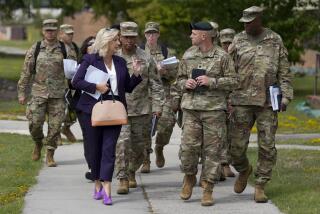Army Reservists Nervous, Excited Over Call-Up Plan : Military: No one knows for sure what lies ahead. But troops training in Los Alamitos say they are ‘hyped.’
- Share via
LOS ALAMITOS — Less than 24 hours earlier, Dr. Mike Cruz had stood over an operating table, going through his daily routine with four cancer-related operations at FHP Medical Center in Fountain Valley.
But Saturday morning, the 31-year-old trauma specialist from Mission Viejo traded in his suit and white lab coat for captain’s bars, khakis and shiny, high-lace black boots as he lined up in tight formation for monthly training alongside a hundred other members of the only MASH Army reserve unit in Southern California.
A two-mile run, grueling sets of sit-ups and push-ups and a host of other military drills were all part of the regimen. And depending on events overseas and in Washington, there might also be a military assignment in the Middle East.
It was a day of anxious chatter, rampant speculation and nervous excitement for hundreds of Army reservists who gathered for regular duty at the regional base at Los Alamitos on Saturday, hours after reports Friday night that President Bush is ready to mobilize tens of thousands of reservists.
The Pentagon has requested the reserve units to meet shortages of support troops resulting from deployment of U.S. forces in the Persian Gulf.
Police officers, nurses, high school teachers and truck drivers on most days, these weekend warriors readied themselves for the prospect of going to war.
“The flag goes up, we get the call and we’ll go,” said Cpl. Alexander Gomez, a Los Angeles County sheriff’s deputy. The dangers of his beat in South-Central Los Angeles pale beside the uncertainty, heat and prospect of chemical weapons in the Middle East, said Gomez, a member of a special-forces airborne reserve unit. “Fear, excitement, it’s all there, but when it’s time to go, you can’t think about that. You just do it.”
Saturday’s schedule proved little different from the weekend duty pulled once a month by the 10,000 reservists in the 63rd Army Reserve Command, which includes all of Southern California, plus Arizona and Nevada, and is based at Los Alamitos. But this was no normal day. On the minds of nearly all were the dramatic events of the last 17 days in the Persian Gulf.
Orders could come as soon as this week, but even reserve commanders say no one knows for sure just what lies ahead for their troops.
One command official said he believes it is unlikely that the reservists would be sent to the Middle East. More likely, he said, is the prospect of their filling in at U.S. bases in place of active troops.
But although officers cautioned against speculation, it seemed to do little to quell the buzz among the troops.
“We’re hyped--no doubt about it,” Sgt. Harold Ford, a 35-year old reservist from Azusa, said as he prepared for drills with a unit that specializes in propaganda and psychological warfare. A few feet away, a sign nailed to a tree said: “Your M-16 Is Your Friend.”
“We’re taught from day one that the chance of having to move quickly into action is always there, and you have to be ready for it,” Ford said. “Well, now we may find out.”
Officials estimate that as many as half the local reservists have seen active duty before, some in Korea, Vietnam, Grenada or Panama. Reservists say they are ready and willing to mobilize if called upon. But even among the veterans, there was some nervousness at the prospect of activation.
“You know when you sign up that there’s always this possibility,” said Army Reserve Capt. Robin Umberg, a veteran of the Korean War who, on Saturday, oversaw a unit of five reservist nurses at the El Toro Marine Base as part of their regular duty.
“But it’s a true reality now,” she said. “It’s started to really touch everyone’s lives.”
Indeed, some reservists have updated their wills in the last few days. Others--particularly those married to fellow reservists--are scurrying to find child-care in case one or both parents is called to duty. Some are starting direct-deposit bank accounts, worried that it could be difficult to find an automatic teller at an Army base in rural America--or Saudi Arabia.
Second Lt. Patrick Attordo, 35, of San Diego, was even trying to figure out how to survive on a potentially long stint without his surfboard. “No waves in the gulf. I’m bummed,” said Attordo, a pre-operative nurse in the local MASH (Mobile Army Surgical Hospital) unit.
For Cruz, the Mission Viejo surgeon, the thought of leaving his wife--pregnant with their third child--is the most troublesome. “There’s a possibility you may never see this kid,” Cruz’s wife told him.
“That really hits you,” he said.
Then, too, there is the “big-time pay cut” he would suffer if he is activated as a MASH surgeon, which pays an annual salary of probably $30,000 to $40,000. He’s not really used to the strict military hierarchy, either.
But Cruz, who received financial help from the Army during his medical residency in exchange for a reserve commitment, said he looks forward to the chance to go to the Middle East.
“To break away from the monotony of my practice and go to Saudi Arabia or some place like that,” he said, “that’s a chance for incredible experience . . . in a field that really interests me. There may never be another opportunity for me to see trauma cases like this. It’s unfortunate, but it’s true.”
More to Read
Sign up for Essential California
The most important California stories and recommendations in your inbox every morning.
You may occasionally receive promotional content from the Los Angeles Times.










